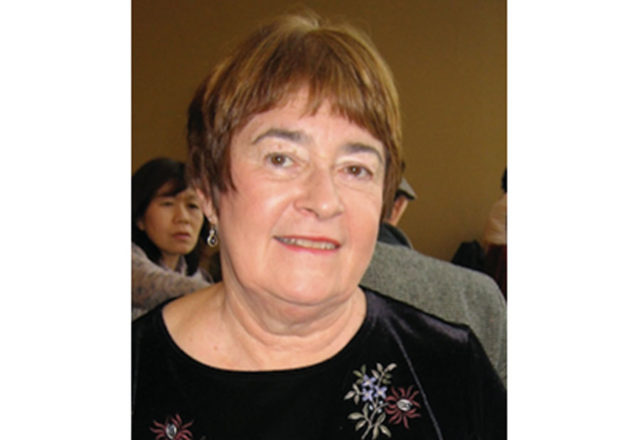An Interview with Jeanne Peterson,
the Seattle Japanese Garden Steering Committee Chair
On June 18, Jeanne Peterson set aside an hour to field questions about the Seattle Japanese Garden (or SJG) from the Post. Ms. Peterson presently chairs the Seattle Japanese Garden Steering Committee and in that capacity, also serves as a Board Member of the Arboretum Foundation. The Foundation is the nonprofit that supports the garden. She began her formal interaction with the garden as a volunteer guide.
About how long have you been a guide at the Garden?
I have been a garden guide since 2010… This involves several days of training at the beginning, followed by shadowing of experienced guides. Tours are [normally] daily or twice daily, as well as by reservation. People visit [the garden] from all over the world. They include many knowledgeable visitors. I have given 21 tours a year of late. Juki Iida, one of the key Japanese designers of the Garden, visited in 1973. He said, essentially, no matter how good a garden’s design, unless you maintain it well, you will lose it. Since then, the garden’s staff and volunteers have done their best to follow his credo.
Is there “secret plumbing” that drives the garden’s watercourses?
Yes, there is secret plumbing. Originally, they just used city water. Today there is a pump house that filters the water for re-use in the waterfall. Of course, there is also natural rainfall and water from natural seeps.
Who takes care of the garden?
There are three full-time gardeners. One has been in the garden every day throughout shelter-in-place to care for the plants. They only use noisy power tools on Monday mornings, when the garden is closed, to preserve its ambiance. Once a year, Masa Mizuno, a Japanese gardening consultant who used to be the senior gardener at the Portland Japanese Garden, comes up to help with pruning and share his recommendations for the garden’s growth.
Has the garden had problems with extreme summer heat in recent years?
Yes, the shore pines have struggled with needle blight in the past five years. They are being treated and gradually being replaced with more heat-resistant varietals. By contrast, the weeping willows seem to be really happy. Algae have also bloomed [in the pond], owing to the higher temperatures, which is a problem. They counteract this by adding cold water. The trick is to treat the algae without using harsh chemicals, which might hurt the aquatic life. These include koi, crayfish, and red-eared slider turtles.
How is the garden managed?
The key organizations are the Seattle Parks Department and the Arboretum Foundation—a nonprofit support group headed by Executive Director Jane Stonecipher. There is also the SJG Steering Committee, with representatives from both organizations as well as concerned citizens such as myself.
What is your background? What brought you to the garden?
I am a former literature and history teacher. As a UW graduate student, I lived above the garden on Capitol Hill. Later in life, I saw a poster in the library requesting guides for the garden. I have long-term interests in world literature.
To run the garden takes money, right?
Yes. It partly comes from city taxes. The garden brings in some revenue, through admissions and memberships. There are also special fundraising events, including Moon Viewing and a biannual summer garden party, which bring in some money and bring new friends to the garden. Lastly, there is the Camellia Circle, comprised of high-end donors, whose names are placed on a plaque in the garden.
I have heard of the Moon Viewing evenings.
The moon viewing happens after dark. It is the only time when the stone lanterns are lit. Lights are also placed in the trees. And there are floating boats with lights. There is also koto music, and there are volunteer astronomers with telescopes. With candor, I must say that many such nights are cloudy but still very special… they attract many young people, some on dates. Young men can be so romantic… There is also Tanabata, when messages are written and hung. Jessa [Gardner, garden programs manager] and her team organize the free family-day events. There is Koi Day, too, in the spring. There is nothing like watching a small child with a bag of koi food feeding the fish. There are free first Thursday events.
Tell us about the community room.
In the old days, there was a [garden] turnstile, that took a dime! Later, there was a booth and a gate attendant. In 2008, there was big fundraising, including city funds and those from major donors. Now there is a gatehouse for the attendant. There is a little office for garden staff The gardeners have an office. And there are indoor bathrooms. Before this, there were only porta-potties, which even ladies in kimono had to use! And there is the Tateuchi Community Room, from the Tateuchi Foundation, which we use for art shows and community activities.
What else is happening now in the garden?
There is a new youth education program, now delayed, which we developed with help from the East Asian Resource Center. The idea is to bring in a diversity of kids, besides those who can already afford to visit through proximity or with their families. The idea is to give kids a deeper understanding of things like Japanese aesthetic values. There are also our Niwa volunteers, who work like silent mice to help with the repetitive weeding and raking the garden requires, under the supervision of staff gardeners.
Our hope is to partially re-open the garden this summer, for small groups, using timed tickets, etc. To stay up to date on garden events, you can subscribe to our garden eNews on the SJG website!
Seattle Japanese Garden is one of the most highly regarded Japanese-style gardens in North America. Tucked within a vast arboretum in a fast-growing city, the garden attracts over 100,000 visitors annually.
1075 Lake Washington Blvd E, Seattle, WA 98112
Tel: (206) 684-4725







